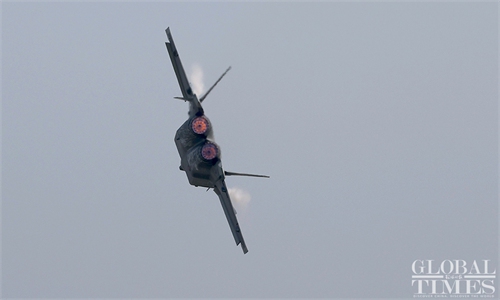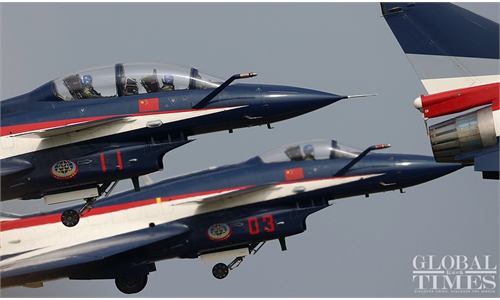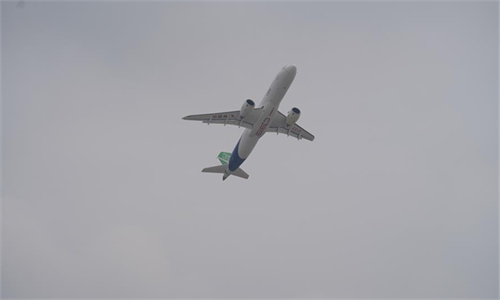COMMENTS / EXPERT ASSESSMENT
C919’s absence from air show doesn’t mean US blockade worked

Illustration: Xia Qing/GT
The 13th China International Aviation & Aerospace Exhibition (Airshow China) kicked off on Tuesday, showcasing a great deal of cutting-edge technologies. But some Western media made a lot of speculation about the absence of China's home-made aircraft at the event, claiming that the absent C919 has found it harder to meet certification and production targets due to the US' tech blockage on China.
The Commercial Aircraft Corp of China (COMAC), the manufacturer of the C919, has been unable to get timely help from suppliers and has run out of some spare parts amid the US' export controls, Reuters reported earlier on Monday, citing anonymous sources.
The domestically manufactured regional jetliner is expected to obtain the airworthiness certification by the end of 2021. It is currently in the key, busy phase for flight tests, which may leave barely time for the jetliner to arrange a showcase at the exhibition.
COMAC, one of the organizers of the Airshow China, displayed its CBJ business jet for the first time at an international air show, and also showcased a mobile digital aircraft display platform of its C919 large passenger jet at the event.
According to the company, six C919 jets are currently conducting test flights in line with standard international procedures. In addition to the C919, the development of the China-Russia joint CR929 wide-body passenger aircraft is progressing smoothly. China's self-developed ARJ21 regional aircraft is already operating on more than 220 routes among over 90 cities and has already carried more than 3.4 million passengers. The CBJ business jet, showcased at the Airshow China, is one of a series of products of ARJ21 aircraft targeting the high-end market.
The remaining items for C919 airworthiness certification are highly unlikely to be impacted by the US' export controls. Though the jet's further mass production schedule may be affected, the promising development of China's domestic aircraft manufacturing sector will not be held back.
The research and development of China's own large passenger jets have already been completed, with matured technical capacity and equipment performances that are up to the standards of mainstream jets across the world.
More importantly, China's huge demand for commercial aircraft over the next two decades will pave the way for the growth and success of the C919. Chinese airlines were estimated to have a demand for 8,575 new planes, and the country's total commercial aircrafts fleet will reach 8,684 by 2035, more than double the size of 2018, according to reports.
Given the massive domestic demand and actively exploration in overseas markets, China's jetliners have a bright future, no matter how much the supply chain landscape changes.
China has been developing its home-grown jetliners with an inclusive approach, adopting a global supply chain with involvement of both US and European companies. It means that the market share of C919 in both home and overseas is directly linked to interests for American and European firms as well.
However, if US authorities, adopting a narrow mindset, chose to continue its efforts to block the development of Chinese jetliners, Chinese developers will adjust their own supply chains, for instance, changing suppliers from the US to Europe. In the meantime, the country is expected to accelerate investment in basic research to break tech bottlenecks and realize technological independence.
With an unrivalled domestic market and increasingly participation of private investment, it is only a matter of time for China to resolve external tech blockages. As one of the top civil aviation markets, China has a firm and solid foundation and determination to develop its own aircraft.
The US should try to understand China's determination so that it won't sacrifice the interests of its companies by preventing them participating in this opportunity. The global civil aviation market is growing, and global players could all gain interest by collaborating.
The article was compiled based on an interview with Wang Yanan, chief editor of Beijing-based Aerospace Knowledge magazine. bizopinion@globaltimes.com.cn



